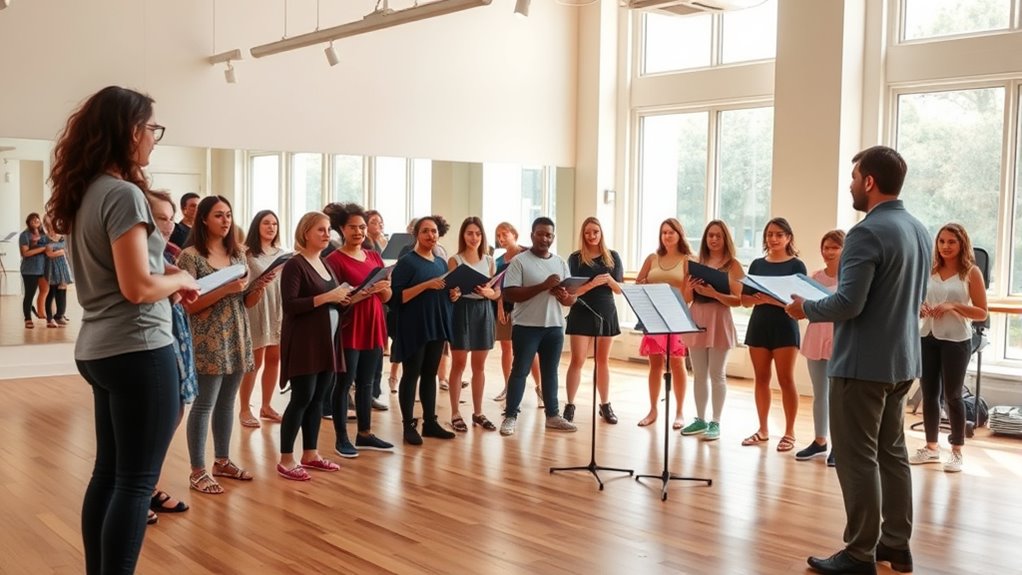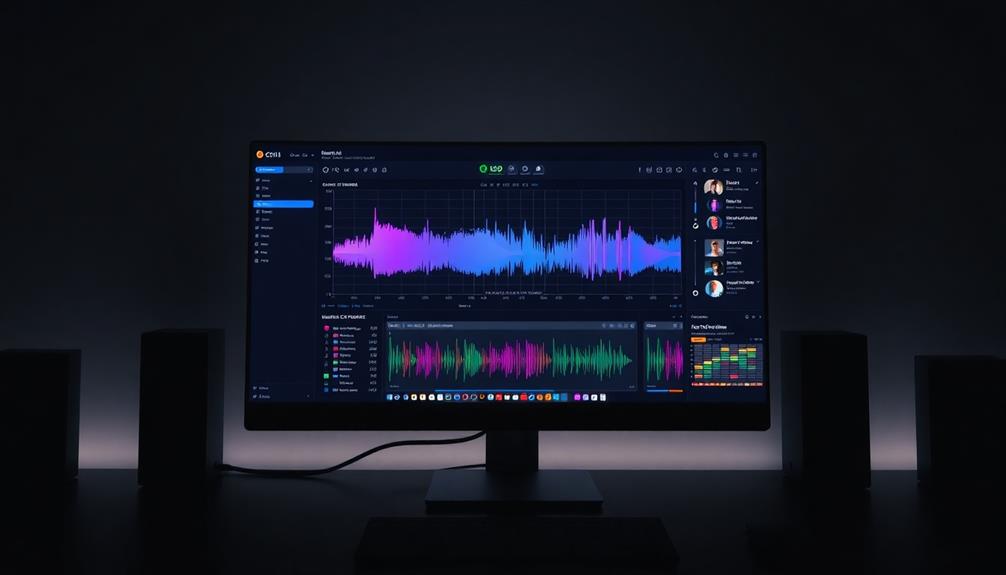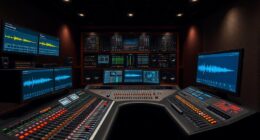Creating a structured rehearsal plan boosts your confidence by setting clear goals, breaking down tricky parts, and practicing consistently. Use techniques like slow practice, visualization, and muscle memory drills to improve coordination and reduce anxiety. Scheduling rehearsals regularly and including feedback helps you track progress and stay motivated. With proper planning and technique, you’ll feel more natural and assured on stage. Keep exploring these strategies to refine your approach even more.
Key Takeaways
- Develop clear, structured rehearsal plans with specific goals to foster a sense of progress and confidence.
- Incorporate slow, deliberate practice of challenging sections to build mastery and reduce performance anxiety.
- Schedule regular rehearsals at consistent times to establish routines and reinforce muscle memory.
- Use visualization and positive feedback techniques to boost confidence and decrease stage fright.
- Adjust rehearsal plans based on progress, ensuring flexibility and continuous improvement for a more assured performance.

Have you ever wondered how performers guarantee a smooth and confident performance? The secret often lies in the careful planning of rehearsal plans, especially the use of effective performance techniques and strategic rehearsal scheduling. When you approach rehearsals with a clear, structured plan, you set yourself up for success, reducing anxiety and boosting your confidence on stage. Performance techniques like slow practice, breaking down complex sections, and using visualization help your brain and body work together more efficiently. These methods deepen your understanding of your role or piece, making your delivery more natural and assured.
Structured rehearsals with strategic techniques boost confidence and ensure polished, natural performances.
Rehearsal scheduling is just as essential. Instead of sporadically practicing whenever you find free time, you need to create a consistent and realistic timetable. By allocating specific days and times for rehearsals, you develop a routine that becomes second nature. This consistency improves muscle memory, sharpens focus, and reduces last-minute stress. When you stagger your rehearsals—perhaps focusing on different sections or skills each session—you avoid burnout and keep your mind engaged. Proper scheduling also involves building in time for rest and reflection, so you can evaluate progress and identify areas needing improvement.
Incorporating performance techniques into your rehearsal schedule makes a significant difference. For example, starting with slow, deliberate practice allows you to master tricky passages before gradually increasing speed. Repeating sections repeatedly helps embed movements and cues into your muscle memory, making your performance smoother. Visualization techniques, where you imagine yourself performing flawlessly, can boost confidence and reduce performance anxiety. You’re teaching your brain to associate the stage with success, which translates into a more relaxed, confident attitude during the actual performance. Additionally, understanding the importance of consistent feedback can help you track your progress and make necessary adjustments effectively.
To maximize the effectiveness of your rehearsal plans, be disciplined about sticking to your schedule. Set clear, achievable goals for each session—such as perfecting a particular scene or mastering specific performance techniques—and track your progress. This focused approach prevents aimless practice and keeps you motivated. Over time, you’ll notice your confidence grow as you see tangible improvements. Remember to review and adjust your rehearsal schedule as needed, especially when facing challenges or new material. Flexibility allows you to stay engaged without feeling overwhelmed.
Ultimately, a well-structured rehearsal plan that combines solid performance techniques with strategic scheduling creates a foundation of confidence. When you know you’ve prepared thoroughly, you step onto the stage with a sense of readiness and self-assurance. Your rehearsals become more than just practice—they become a essential tool for transforming nervous energy into polished, captivating performances.
Frequently Asked Questions
How Do I Tailor Rehearsal Plans for Different Skill Levels?
You tailor rehearsal plans by incorporating differentiated instruction and skill-specific techniques to meet each learner’s needs. Identify their current skill levels, then modify activities to challenge beginners without overwhelming advanced participants. Use targeted exercises for specific skills, offer varied practice methods, and provide extra support or extensions as needed. This personalized approach helps build confidence, encourages progress, and keeps everyone engaged, regardless of their skill level.
What Equipment Is Essential for Effective Rehearsals?
You need essential equipment like stage lighting to set the mood and focus attention, plus sound equipment such as microphones and speakers to guarantee clear audio. These tools help create a realistic rehearsal environment, boosting confidence and performance quality. Make sure your lighting is adjustable for different scenes, and test sound equipment beforehand to avoid technical issues. With this gear, you’ll rehearse more effectively and feel more prepared for the actual performance.
How Can I Handle Last-Minute Rehearsal Changes?
Imagine your rehearsal unexpectedly changes last minute, like a key actor falling ill. You should employ flexibility strategies such as quickly adjusting the schedule and roles. Use clear communication techniques to inform everyone promptly, ensuring they understand the new plan. Stay calm and adaptable, encouraging team members to embrace the change. This approach helps maintain confidence and keeps rehearsals productive, even when surprises disrupt your initial plans.
What Are Common Mistakes to Avoid During Rehearsals?
You should avoid skipping warm-up routines, as they prepare everyone physically and mentally. Don’t forget to use effective feedback techniques; be specific and constructive to help performers improve. Avoid rushing through rehearsal segments, and make certain all team members stay engaged. Steer clear of negative criticism, and instead, focus on encouraging growth. By maintaining a positive atmosphere and paying attention to these details, you’ll keep rehearsals productive and confidence-boosting.
How Do I Measure Rehearsal Effectiveness?
You measure rehearsal effectiveness by tracking performance metrics like timing, accuracy, and audience engagement. Use feedback strategies such as recording rehearsals and reviewing them critically, or asking peers for constructive input. Observe improvements over time, noting how well performers meet set goals. If progress stalls, adjust your rehearsal plan accordingly. Consistent evaluation helps you identify strengths and areas needing improvement, ensuring your rehearsals truly build confidence and skills.
Conclusion
By following these rehearsal plans, you’ll gently nurture your confidence, allowing it to blossom quietly over time. Remember, each practice session is like tending to a delicate garden—patience and care will help your skills flourish unnoticed. Embrace the process, and soon enough, you’ll find yourself stepping onto the stage with a calm, assured presence. Trust in your journey, and let your quiet preparation lead to a shining performance you’ll be proud of.









